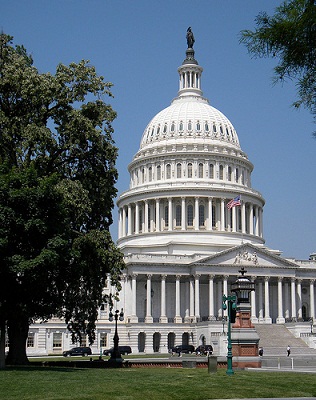House Rejects Patriot Act Extension

The measure failed by a 277-148 vote. It needed two-thirds of the vote in order to pass.
The Washington Post reported: "The measure would have extended three key provisions of the Patriot Act that are set to expire on Monday, Feb. 28, unless Congress moves to reauthorize them. One of the provisions authorizes the FBI to continue using roving wiretaps on surveillance targets; the second allows the government to access "any tangible items," such as library records, in the course of surveillance; and the third is a "lone wolf" provision of the Intelligence Reform and Terrorist Prevention Act that allows for the surveillance of targets who are not connected to an identified terrorist group."
The White House earlier had expressed support for a temporary extension, but noted in a written statement, "The administration would strongly prefer enactment of reauthorizing legislation that would extend these authorities until December 2013."
House Judiciary Chairman Lamar Smith (R-Texas) is among those who supported a long-term extension. "We need the PATRIOT Act to prevent attacks and apprehend terrorists," he said in a statement on Jan. 26. "This short-term extension is a step toward the long-term reauthorization of important and necessary national security provisions."
The extension is being considered in the Senate, where three separate bills to extend parts of the Patriot Act have already been introduced.
A bill sponsored by Senate Intelligence Committee Chairwoman Dianne Feinstein (D-Calif.) would leave the law intact and extend the three expiring provisions through December 2013.
A similar bill by Senate Judiciary Committee Chairman Patrick Leahy (D-Vt.) also would extend the authorities for three year, but calls for additional oversight of government surveillance powers, particularly a federal agency’s ability to track an individual’s library records.
Meanwhile, a proposal by Sen. Chuck Grassley (R-Iowa) would permanently reauthorize the Patriot Act, which was first signed into law by President George W. Bush in 2001 after the Sept. 11, 2001, terrorist attacks.
The bill faced some opposition within the GOP, with some Tea Party Republicans expressing concern that the law represents government overreach.
"There need to be sunsets on the bill after that in order to have adequate accountability and oversight," said Rep. Louie Gohmert (R-Texas). "Until sunsets come up, it is often difficult to get the answers we need to do necessary oversight to avoid abuses."
Civil-liberties advocates are also against making the law permanent.
"We believe the Patriot Act is unconstitutional, so the shorter that lies in effect, the better," Michelle Richardson, legislative counsel for the American Civil Liberties Union, said. "That being said, if this is just to give the House more time to make the case that the Patriot Act should be permanent, that's another story."



